
» Software
This page provides an overview of the most common software available for CCMs. All programmes are provided free of charge and their developers have invested much time and effort into developing, programming, maintaining and documenting them. If you make use of software, we would thus ask you to acknowledge this by citing it in your work, also in the interest of scientific transparency and replicability. If you have any questions or comments related to a specific programme, please contact its author(s).
| Software | Environment | Methodology |
|---|---|---|
| acq | Unix shell | csQCA, fsQCA |
| FSGoF | DOS | Fit test for fuzzy-set analysis |
| fs/QCA 2.5 | Windows | csQCA, fsQCA |
| fs/QCA 3.0 | Windows, macOS | csQCA, fsQCA |
| fuzzy | Stata | csQCA, fsQCA |
| Kirq | Windows, macOS, Linux | csQCA, fsQCA |
| MDSO/MSDO | Web app | MDSO/MSDO |
| EvalC3 | Microsoft Excel (Windows) | Configurational Prediction Modeling |
| Tosmana | Windows (.NET/Mono) | csQCA, mvQCA, fsQCA |
| QCA Add-in for Excel | MS Excel (Windows, Mac) | csQCA, mvQCA, fsQCA |
| cna | R | Coincidence analysis |
| SetMethods | R | Additional functions for QCA |
| LogicOpt | R | Truth table minimization |
| NCA | R | Necessary conditions analysis |
| QCA | R | csQCA, mvQCA, fsQCA |
| QCA3 | R | csQCA, mvQCA, fsQCA |
| QCAfalsePositive | R | Test for Type I errors |
| QCApro | R | csQCA, mvQCA, fsQCA |
| QCAtools | R | Additional functions for QCA |
fs/QCA
Description: fs/QCA was the first software package for conducting QCA, developed by Charles Ragin, Sean Davey, and Kriss Drass. It has been in existence since 1992 (predecessors QCA 3.0, fs/QCA 2.5). It may be downloaded at http://www.fsqca.com. Version 3.0 runs on both Windows and macOS. A manual is not yet available for this version but it operates similarly to version 2.5.| Screenshots | |









|
|
Please cite this software as follows: Ragin, Charles, and Sean Davey. 2017. fs/QCA [Computer Programme], Version 3.0. Irvine, CA: University of California.
FSGoF
Description: FSGoF is a command prompt-based executable file. It has been developed with a strong orientation towards the incorporation of goodness-of-fit statistics. The authors are Scott Eliason and Robin Stryker. The programme and manual can be downloaded from this website.NOTE: This software is not maintained any longer.
Please cite this software as follows: Eliason, Scott, and Robin Stryker. 2009. "Goodness-of-Fit Tests and Descriptive Measures in Fuzzy-Set Analysis." Sociological Methods & Research 38 (1):102-46.
Kirq
Description: Kirq is a user-friendly, cross-platform GUI programme for conducting crisp- and fuzzy-set QCA. The authors are Christopher Reichert and Claude Rubinson. The programme can be downloaded from its website, where more information and screenshots are also available.| Screenshots | |




|
|
Please cite use of the software as: Reichert, Christopher and Claude Rubinson. 2014. Kirq [Computer Programme], Version 2.1.12. Houston, TX: University of Houston-Downtown.
On Kirq, see also: Rubinson, Claude. 2013. "Contradictions in fsQCA." Quality & Quantity 47 (5):2847-67.
acq
Description: acq is a suite of Unix shell tools for conducting crisp- and fuzzy-set QCA. The authors are Claude Rubinson and Christopher Reichert. The programme can be downloaded from its website, where more information is available.Please cite use of the software as: Claude Rubinson and Christopher Reichert. 2014. acq [Computer Programme], Version 2.1.12. Houston, TX: University of Houston-Downtown.
MDSO/MSDO
Description: MDSO/MSDO is a web-app for conducting MDSO/MSDO analysis. The programme may be accessed at http://www.jchr.be/01/v11.htm.Please cite use of the software as: Gisèle De Meur and Jean-Christophe Beumier. 2015. MDSO/MSDO [Computer Programme], Version 1.1. URL: http://www.jchr.be/01/v11.htm.
EvalC3
Description: EvalC3 is an Excel (Windows-only) application for conducting configurational comparative research using predictive analytic algorithms and other methods. It enable users (a) to identify sets of attributes that describe a project intervention & its context, and which are good predictors of the achievement of an outcome of interest, (b) to compare and evaluate the performance of these predictive models, and (c) to identify relevant cases for follow-up within-case investigations to uncover any causal mechanisms at work. The programme may be downloaded at https://evalc3.net/.| Screenshots | |
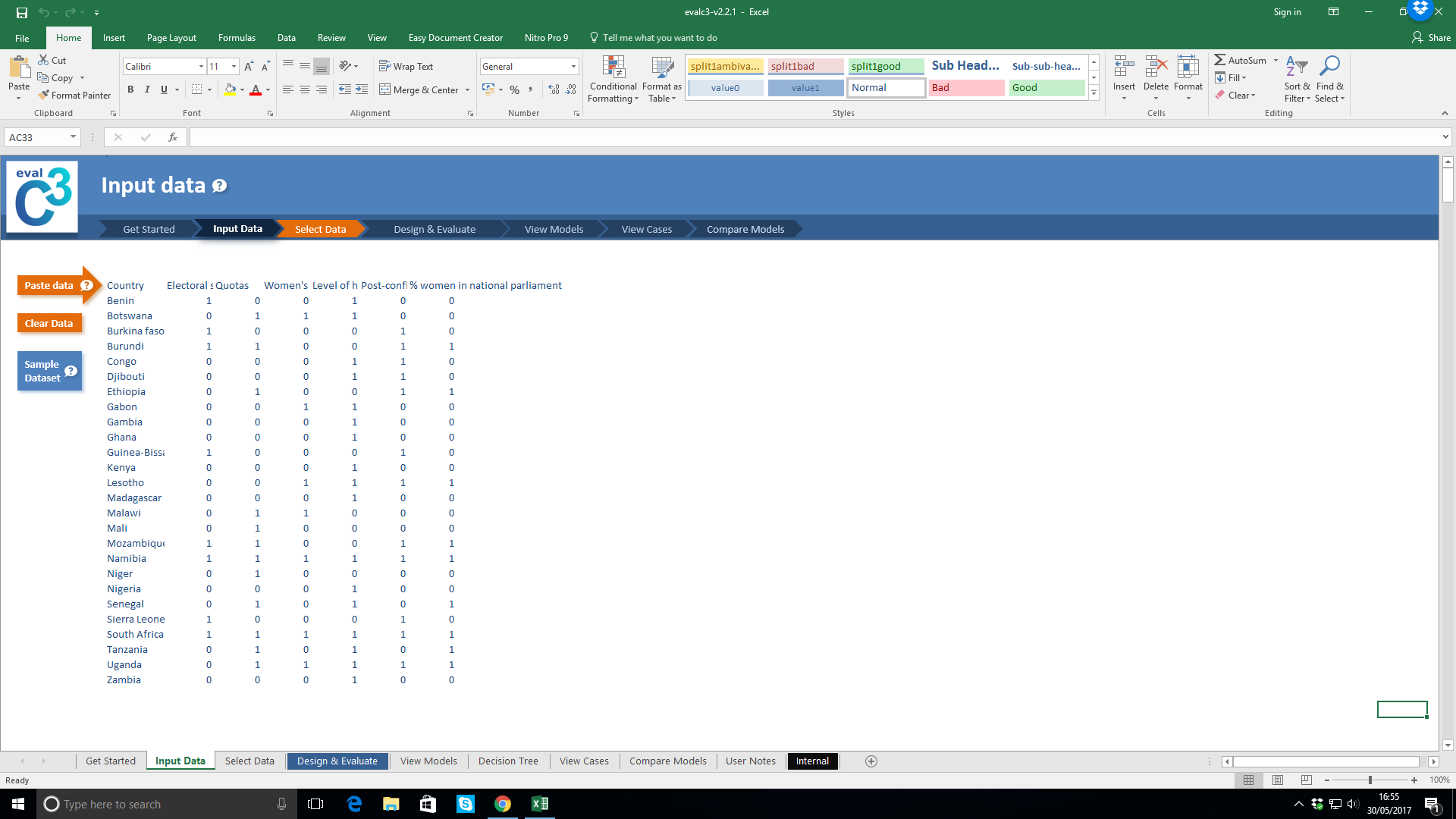
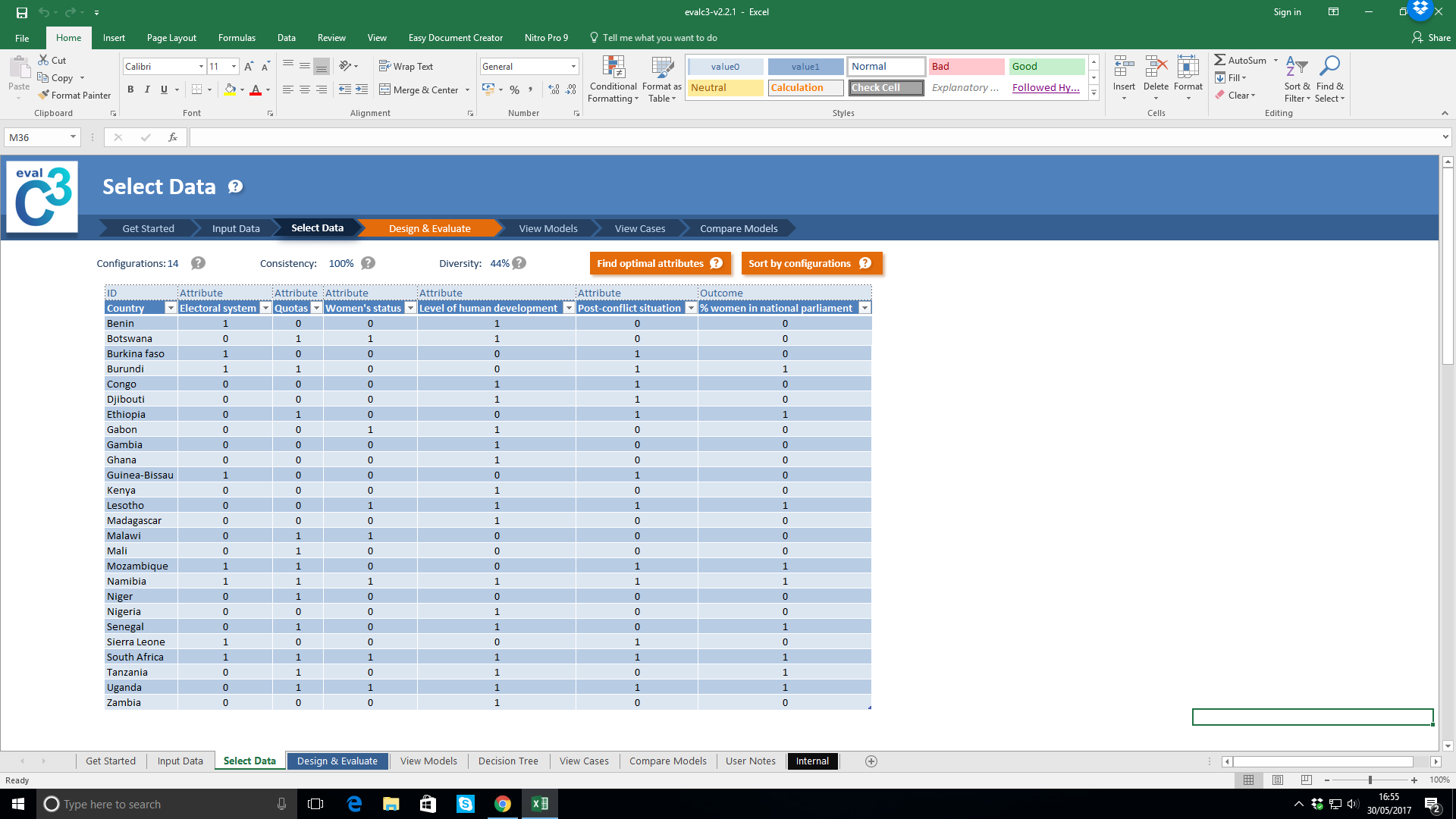
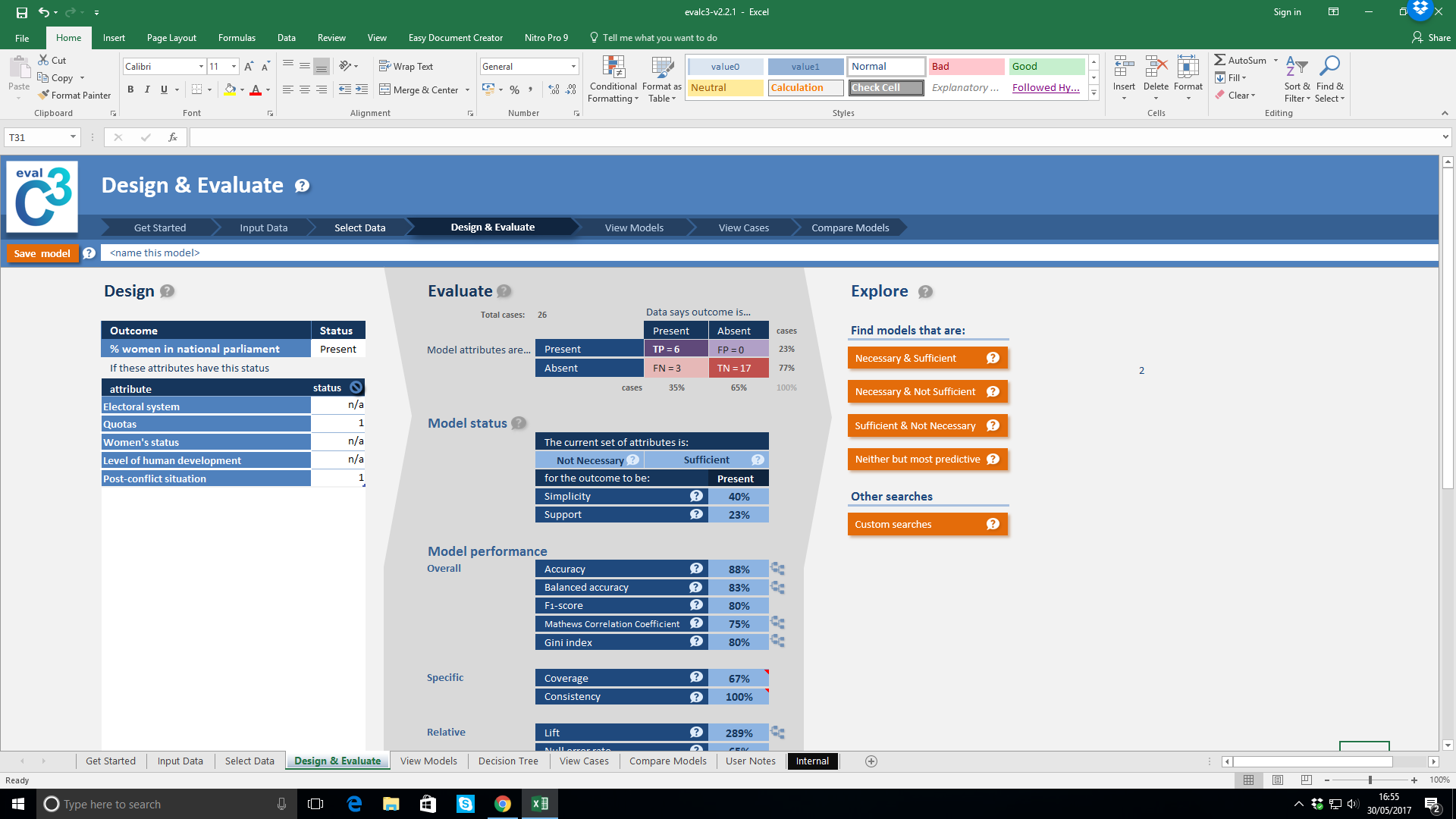
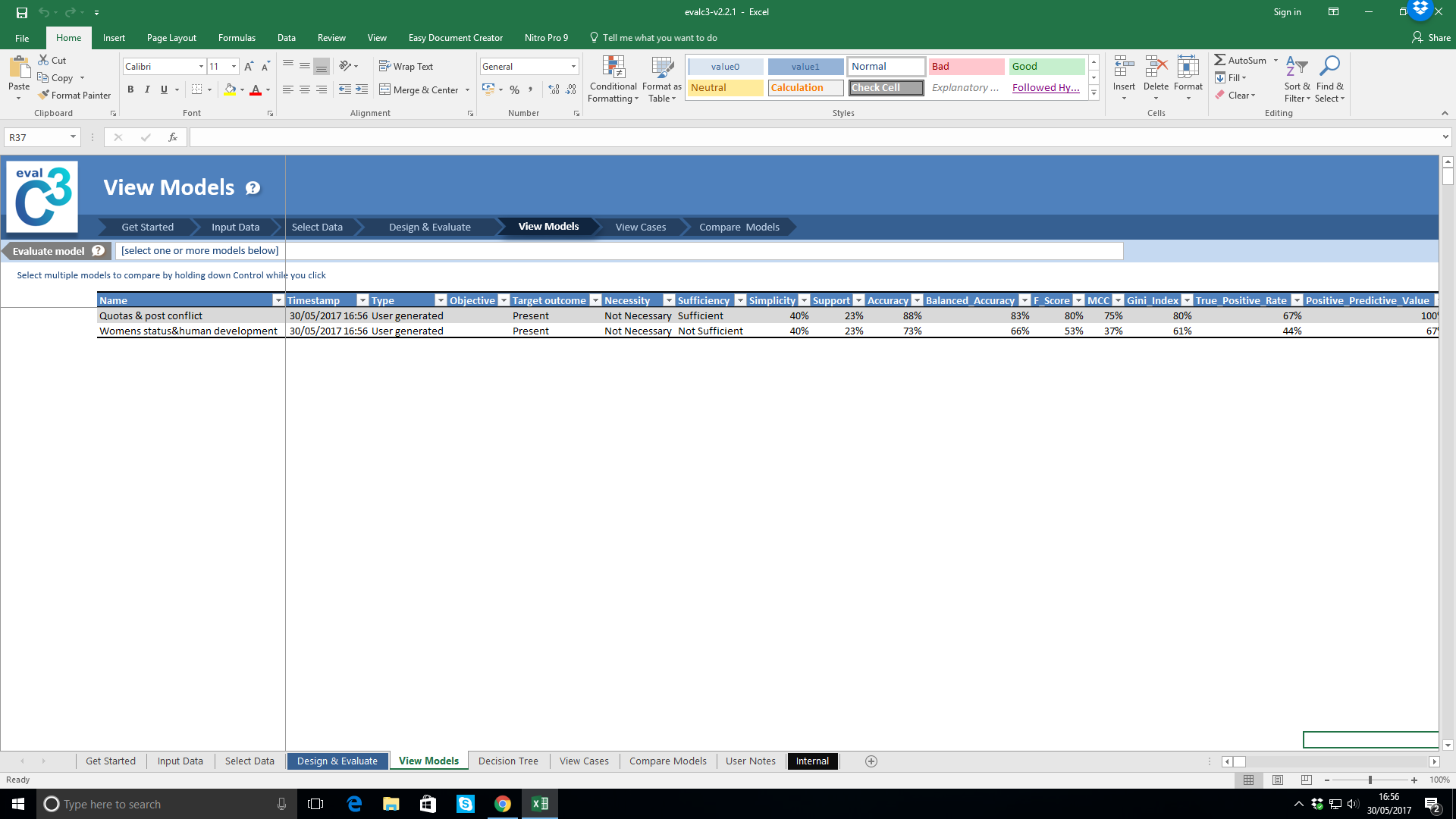
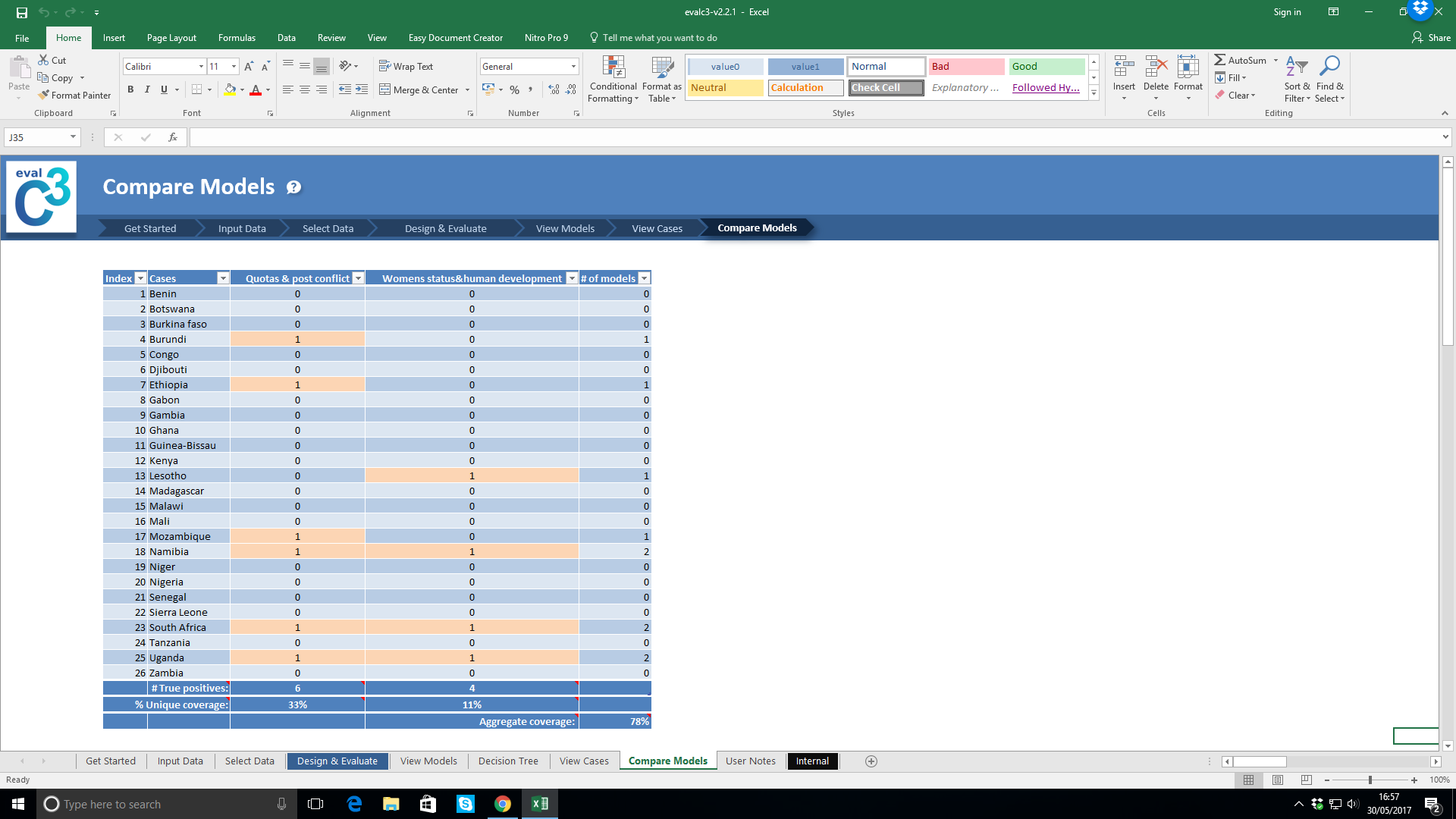
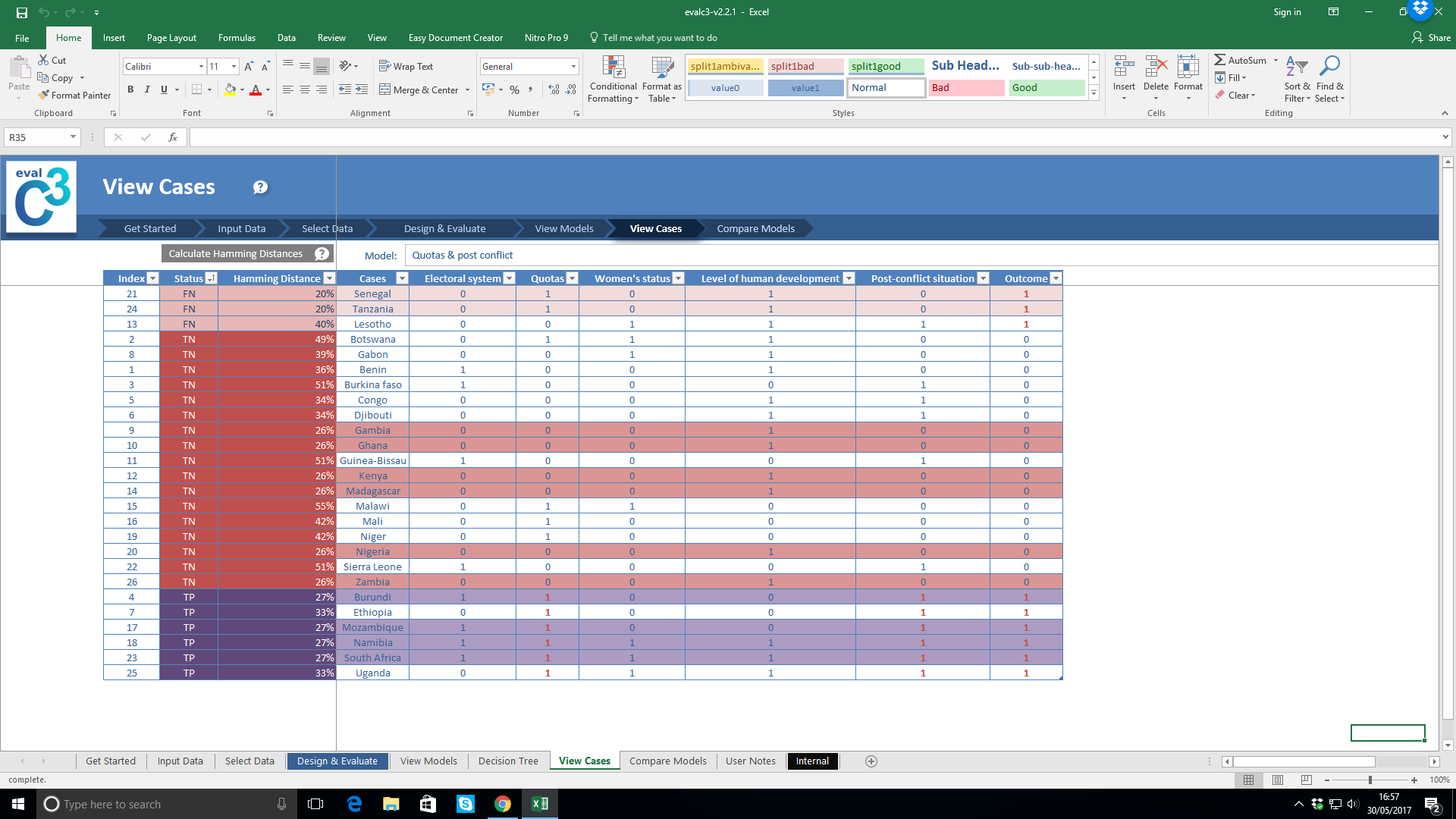
|
|
Please cite use of the software as: Rick Davies. 2015. EvalC3 [Computer Programme]. URL: https://evalc3.net/.
R Package "cna"
Description: The cna package implements the method of Coincidence Analysis (CNA), which is a configurational comparative method related to QCA. Unlike QCA, however, CNA can treat any number of factors as outcomes, and it does not generate causal models from the top down by first building maximal Boolean dependency structures and then eliminating redundant elements; rather, CNA—as implemented in version 2.0.0 of the CNA R-package—builds causal models from the bottom up by gradually combining single factors to complex dependency structures, such that the resulting models are automatically redundancy-free. As a consequence, CNA can identify common-cause and causal-chain structures and it avoids the task of redundancy elimination. Moreover, data fragmentation does not force CNA to resort to counterfactual reasoning. While previous versions of the cna package have only been capable of processing dichotomous variables/factors, this package version generalizes CNA for multi-value and continuous variables/factors whose values are interpreted as membership scores in fuzzy sets.
The package can be installed from within R or be downloaded from the Comprehensive R Archive Network, where the manual and more details about the package are also available.
| Screenshots | |




|
|
Please cite this software as follows: Baumgartner, Michael, and Alrik Thiem. 2015. "Identifying Complex Causal Dependencies in Configurational Data with Coincidence Analysis." The R Journal 7 (1):176-84.
and, for the specific (latest) version used: Ambuehl, Mathias and Michael Baumgartner. 2017. cna: Causal Modeling with Coincidence Analysis. R package version 2.0.0. URL: http://cran.r-project.org/package=cna.
For a technical introduction to CNA, see: Baumgartner, Michael. 2009. "Inferring Causal Complexity." Sociological Methods & Research 38 (1):71-101.
R Package QCA
Description: The package QCA offers an extensive set of functions to perform Qualitative Comparative Analysis: crisp sets ('csQCA'), temporal ('tQCA'), multi-value ('mvQCA') and fuzzy sets ('fsQCA'), using a GUI - graphical user interface. It contains the most advanced truth table and minimization procedures available including Enhanced Standard Analysis, to complement a state of the art set of calibration methods and theory evaluation features.
The package can be installed from within R or be downloaded from the Comprehensive R Archive Network, where the manual and all details about the package are available.
Note that QCApro and QCA should not be loaded in one and the same R session as some object and function names still overlap.
| Screenshots | |








|
|
Please cite use of the software as:QCA with R: A Comprehensive Resource Springer International Publishing. URL: http://www.adriandusa.eu
R Package "QCAfalsePositive"
Description: Implements tests for Type I error in Qualitative Comparative Analysis (QCA) that take into account the multiple hypothesis tests inherent in the procedure. Tests can be carried out on three variants of QCA: crisp-set QCA (csQCA), multi-value QCA (mvQCA) and fuzzy-set QCA (fsQCA). For fsQCA, the fsQCApermTest() command implements a permutation test that provides 95% confidence intervals for the number of counterexamples and degree of consistency, respectively. The distributions of permuted values can be plotted against the observed values. For csQCA and mvQCA, simple binomial tests are implemented in csQCAbinTest() and mvQCAbinTest(), respectively.
The package can be installed from within R or be downloaded from the Comprehensive R Archive Network, where the manual and all details about the package are available.
Please cite this software as follows: Braumoeller, Bear. 2015. QCAfalsePositive: Tests for Type I Error in Qualitative Comparative Analysis (QCA). R Package Version 1.1.1. URL: http://cran.r-project.org/package=QCAfalsePositive.
R Package "QCApro"
Description: The full description of QCApro and more details can be found on Alrik Thiem's website.
The package may be installed from within R, or downloaded from either Alrik Thiem's website or the Comprehensive R Archive Network, where the manual and all details about the package are available.
Note that QCApro and QCA should not be loaded in one and the same R session as some object and function names still overlap.
| Screenshots | |








|
|
Please cite use of the software as: Thiem, Alrik. 2016. QCApro: Professional Functionality for Performing and Evaluating Qualitative Comparative Analysis. R Package Version 1.1-1. URL: http://www.alrik-thiem.net/software/.
R Package "QCAtools"
Description: Helper functions for Qualitative Comparative Analysis: evaluate and plot Boolean formulae on fuzzy set score data, apply Boolean operations, compute consistency and coverage measures.
The package can be installed from within R or be downloaded from the Comprehensive R Archive Network, where the manual and all details about the package are available.
Please cite this software as follows: Lewandowski, Jirka. 2016. QCAtools: Helper Functions for QCA in R. R Package Version 0.2.1. URL: http://cran.r-project.org/package=QCAtools.
R Package "QCA3"
Description: A set of functions for Qualitative Comparative Analysis (QCA). It can be used for various types of QCA (csQCA, mvQCA, fsQCA, and crisp-set TQCA and time-series QCA). It has methods for simplifying assumptions and contradictory simplifying assumptions.
The package can be installed from within R or be downloaded from the Comprehensive R Archive Network, where the manual and all details about the package are also available.
| Screenshots | |




|
|
Please cite this software as follows: Huang, Ronggui. 2014. QCA3: Yet another Package for Qualitative Comparative Analysis. R Package Version 0.0-7. URL: http://cran.r-project.org/package=QCA3.
STATA Package "fuzzy"
Description: fuzzy is an ado-file for the commercial statistical software STATA. It has been developed with a strong orientation towards the incorporation of inference-statistical procedures. The authors are Kyle Longest and Stephen Vaisey.
NOTE: This software is not maintained any longer.
| Screenshots | |





|
Please cite this software as follows: Longest, Kyle C., and Stephen Vaisey. 2008. "fuzzy: A program for Performing Qualitative Comparative Analyses (QCA) in Stata." Stata Journal 8 (1):79-104.
R Package "SetMethods"
Description: SetMethods began as a software companion to the text Set-Theoretic Methods for the Social Sciences (Schneider and Wagemann 2012) but has evolved into a comprehensive set of functions for performing advanced set-theoretic analyses and QCA. This includes functions for performing set-theoretic multi-method research; set-theoretic theory evaluation; Enhanced Standard Analysis; various visualisations (enhanced xy plot, radar chart); and diagnosing the impact of temporal, spatial, or substantive clusterings of the data on the results obtained via Qualitative Comparative Analysis (QCA). It still retains the deta sets for replicating the examples in the book and online appendix.
The package can be installed from within R or be downloaded from the Comprehensive R Archive Network, where the manual and all details about the package are available.
Please cite this software as follows: Juraj Medzihorsky, Ioana-Elena Oana, Mario Quaranta and Carsten Q. Schneider. 2016. SetMethods: Functions for Set-Theoretic Multi-Method Research and Advanced QCA. R package version 2.3. URL: https://cran.r-project.org/web/packages/SetMethods/index.html.
R Package "NCA: Necessary Condition Analysis"
Description: Performs a Necessary Condition Analysis (NCA) (Dul 2016). NCA identifies necessary (but not sufficient) conditions in datasets, using a ceiling line that separates the area with observations from the area without observations. The ceiling line is a (piecewise) linear non-decreasing line that indicates which level of X is necessary but not sufficient for a (desired) level of Y.
The package can be installed from within R or be downloaded from the Comprehensive R Archive Network, where the manual and all details about the package are available.
Please cite this software as follows: Dul, Jan. 2016. NCA: Necessary Condition Analysis. R Package Version 2.0. URL: http://cran.r-project.org/package=NCA.
- On NCA, see also:
- "Necessary Condition Analysis (NCA) with R (Version 2.0): A Quick Start Guide" (Dul 2016)
- NCA website
R Package "LogicOpt: Truth Table Optimizer"
Description: Access to powerful logic minimization algorithms and data structures that operate on a sum-of-products truth table. The core algorithms are built on Espresso Version 2.3 developed at UC Berkeley for digital logic synthesis purposes. Enhancements have been made to integrate within the R framework and support additional logic optimization use cases such as those needed by Qualitative Comparative Analysis (QCA) and Genetic Programming.
The package can be installed from within R or be downloaded from the Comprehensive R Archive Network, where the manual and all details about the package are available.
Please cite this software as follows: Stiehl, William. 2016. LogicOpt: Truth Table Logic Optimizer. R Package Version 1.0. URL: http://cran.r-project.org/package=LogicOpt.
Tosmana
Description: Tosmana can be used for conducting crisp- and multivalued-QCA. As of version 1.52, the software has additionally added preliminary support for conducting fuzzy-set QCA. Tosmana may be run under macOS or Linux using the Mono framework, although this implementation is still experimental. The author is Lasse Cronqvist. The latest version may be downloaded from http://www.tosmana.net.
| Screenshots | |







|
|
Please cite this software as follows: Cronqvist, Lasse. 2017. Tosmana: Tool for Small-N Analysis, Version 1.54. Trier: University of Trier, URL: http://www.tosmana.net
QCA Add-in for Excel
Description: The QCA add-in allows QCA calculations within Excel. The add-In can be used for csQCA, mvQCA as well as for fsQCA. The add-in is provided by Lasse Cronqvist. The latest version can be downloaded from https://www.qca-addin.net.
compasss.org© - Page last modified 2019-01-31 18:20:49 UTC
 Top
Top